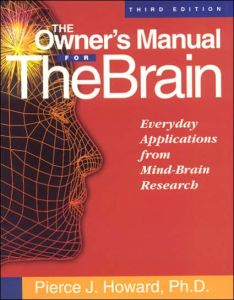Join getAbstract to access the summary!

Join getAbstract to access the summary!
Pierce J. Howard
The Owner's Manual for the Brain
Everyday Applications from Mind-Brain Research
Bard Press, 2006
What's inside?
Know how to use your head? Cognitive scientists tell you what to do to turbocharge your brainpower.
Recommendation
Do you use your head? Do you think before you act? Do you really know how to ponder things? Pierce J. Howard does. As the director of research at a cognitive science center, he has developed a truly practical, well-organized book about the brain, complete with information on how to think more effectively. He details, in a fascinating, comprehensive fashion, the latest knowledge about mind-brain functioning. You can put his specific, helpful reporting to work to boost your mental prowess and overall health. getAbstract recommends this excellent book to readers who want to know how their thinking works, and to learn how to improve and protect their brainpower.
Summary
About the Author
Pierce J. Howard, adjunct professor of psychology at the University of North Carolina at Charlotte, is the research director at the Center for Applied Cognitive Studies, a research firm that provides programs based on cognitive science. He also is an expert on organizational development.
















Comment on this summary